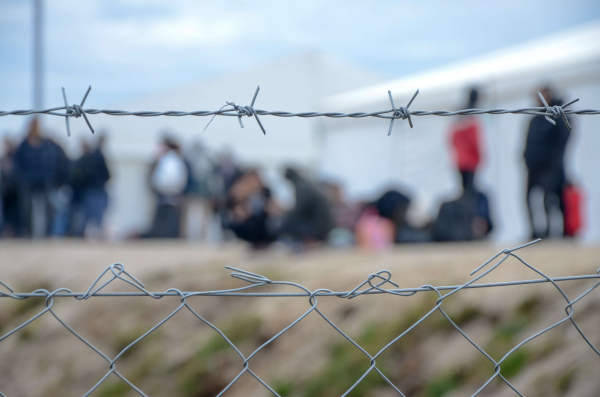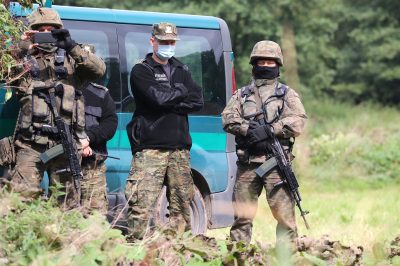
The provincial administrative courts have ruled that the removal of migrants to Belarus constitutes a systematic violation of the rights of persons crossing the border. The jurisprudence is consistent and shows that the current functioning of the services at the Polish-Belarusian border violates Polish and international law, in particular the Geneva Convention, the Charter of Fundamental Rights of the European Union, the European Convention on Human Rights and the Constitution of the Republic of Poland. In their judgments, the courts pay particular attention to the following aspects:
Violations of the principle of non-refoulement
In its judgments of 15 September 2022 (case nos.: II SA/Bk 492/22, II SA/Bk 493/22 and II SA/Bk 494/22), the Provincial Administrative Court in Białystok found that a state party to the Geneva Convention is obliged to apply the principle of non-refoulement wherever its jurisdiction extends, i.e. in any place where a person is under the effective control of state authorities. It does not matter where a particular situation arises in relation to the potential return of a migrant. The only relevant question is whether a particular act can be attributed to a particular country. Similarly, in judgment of 26 April 2022 in case no. IV SA/Wa 420/22, the Provincial Administrative Court in Warsaw ruled that the principle of non-refoulement applies both to persons who are on the territory of a state and to those who are at its border, regardless of how they got there. The Court also pointed out that the application of this principle cannot be excluded or suspended by the state authorities even in the event of a crisis at the border.
Border Guard must take into account the situation in Belarus and the context of the humanitarian crisis
The settled case law of the administrative courts points to the need to take into account the circumstances of the crisis on the Polish-Belarusian border when initiating measures or procedures that may lead to the return of a foreigner to the border line. The fact that failure to take these circumstances relevant to the case into account constitutes a violation of the principle of non-refoulement was established by the Provincial Administrative Court in Białystok, among others, in the above-mentioned judgments of 15 September 2022 (case numbers II SA/Bk 492/22, II SA/Bk 493/22 and II SA/Bk 494/22). A similar position in connection with decisions requiring a person to leave the territory of Poland was formulated by the Provincial Administrative Court in Warsaw in the judgments of 27 April 2022 (case no. Act 471/22), 20 May 2022 (case no. Act IV SA/Wa 615/22) and 27 May 2022 (case no. IV SA/Wa 772/22). According to the court, the shortcomings of the Border Guard authorities in the cases under review were that they did not take into account the situation on the Polish-Belarusian border and, in particular, disregarded information about the inability of foreigners to move within Belarusian territory and their detention by the Belarusian services and military. According to the court, it was indeed necessary to review this information in order to clarify whether the implementation of the decision ordering a person to leave Polish territory, i.e. the de facto return of the foreigner to the border line, did not violate the right to life and freedom from torture and inhuman treatment (i.e. Articles 2 and 3 ECHR) in each individual case. The court was of the opinion that it did not matter whether the foreigner in question had entered Belarus legally. The situation related to the border crisis excludes the possibility of migrants to move freely on the territory of this country and return to their country of origin, the court argued, and exposes foreigners to extreme conditions that violate their dignity and threaten their lives or health.
Violation of the prohibition of collective expulsion of foreigners – Article 4, Protocol 4 to the ECHR
The Provincial Administrative Court in Białystok (in judgments II SA/Bk 492/22, II SA/Bk 493/22 and II SA/Bk 494/22 and II SA/Bk 145/23) found that when returning a foreigner to the border line, the Border Guard authority does not investigate the individual situation of the rejected person, does not collect evidence and does not verify the facts and does not take into account the situation in the Polish-Belarusian border area and circumstances such as the state of health or age of the person concerned. The court recalled that the prohibition of collective expulsion of foreign nationals in Article 4 of Protocol No. 4 to the ECHR entails the obligation to examine the case of each person individually, including in conditions of mass arrival and with particular regard to the situation in the country to which the migrants are to be returned. Therefore, the Court had no doubt that the inaction of the Border Guard, which led to the arbitrary and automatic application of the provision of the Border Regulation, constituted a violation of the above-mentioned prohibition.
Receipt of applications for international protection and violation of Article 56 (2) of the Constitution of the Republic of Poland and Article 18 CFREU
In the judgments II SA/Bk 492/22, II SA/Bk 493/22 and II SA/Bk 494/22, the Court had no doubt that the declaration of intention to make an application for international protection should be received by a Border Guard officer who comes into contact with a migrant for the first time and that the foreign national making such a declaration to the officer should be able to make a formal application as soon as possible and be treated as an applicant and have the right to remain on the territory of Poland. In the court's view, behaviour to the contrary made it impossible to ensure the alien's effective access to the principles and guarantees of the Procedural Directive and the Act on granting protection to foreigners on the territory of the Republic of Poland and constituted a failure to respect the right to international protection guaranteed by Article 56(2) of the Constitution and Article 18 of the Charter of Fundamental Rights of the European Union.
Border Regulation issued beyond the limits of statutory powers
In its judgments of 15 September 2022 (case numbers II SA/Bk 492/22, II SA/Bk 493/22 and II SA/Bk 494/22), the Provincial Administrative Court in Białystok found that Section 3 (2b) of the Border Regulation is incompatible with Article 16 (3) (2) of the State Border Protection Act, which was cited as the basis for issuing the above-mentioned regulation. Section 3 (2b) of the Regulation goes beyond the limits of the statutory authorisation, which does not constitute a power to introduce a procedure in connection with the return of foreigners to the border line. The Court also found that the said provision violates applicable laws (i.e. the Foreigners Act and the Act on granting protection to foreigners in the territory of the Republic of Poland), EU law and the provisions of international agreements binding Poland, which, according to the Court, makes this provision unenforceable.
Similarly, the Provincial Administrative Court in judgment of 13 April 2023 (case number II SA/Bk 145/23) held that Article 16 (3) (2) of the State Border Protection Act authorises the Minister responsible for internal affairs to order the temporary suspension or restriction of traffic at certain border crossings by means of a regulation if this is necessary to ensure state or public security or to protect against threats to human life or health and to prevent the spread of animal diseases. It is clear from the wording of the provision in question that the scope of the legal authorisation contained therein only covers issues of traffic management at certain border crossings, i.e. e.g. the closure of crossings, the reduction of their capacity or the temporary modification of the types of traffic permitted. Article 16 (3) (2) of the State Border Protection Act cannot therefore be a basis for introducing regulations on the right of foreigners to enter or stay in Poland, as these rights are comprehensively regulated at the legislative level, i.e. in the provisions of the Foreigners Act and the Act on granting protection to foreigners in the territory of the Republic of Poland. A fortiori, the provision does not authorise the Minister of the Interior and Administration to introduce a procedure for the return of foreigners to the borderline in a regulation. In this respect, the Border Regulation thus interferes with the statutory matter and contradicts the provisions of a piece of primary legislation. According to the court, this constitutes a violation of Article 92 § 1 of the Polish Constitution.
Violation of Articles 7 and 87 (1) of the Polish Constitution
According to the Provincial Administrative Court in Białystok (judgment of 13 April 2023, case number II SA/Bk 145/23), the automatic and arbitrary application by the Border Guard of a lower-ranking, regulation-level provision, which does not exclude the application of provisions of national or EU law or provisions of international agreements binding on the Republic of Poland, and above all the Constitution of the Republic of Poland, is primarily a violation of Article 7 (the principle of the rule of law) and Article 87 (1) (the principle of hierarchy of sources of law) of the Constitution of the Republic of Poland.
The lack of official proof that a migrant was returned to the border line cannot undermine the credibility of their account
In the judgment of 13 April 2023 (case number II SA/Bk 145/23) a Białystok court agreed with the argument that the manner in which the Border Guard carries out the return to the border line means that there is often no other evidence outside a foreigner's own account that confirms the fact of their apprehension and return to the border line, and in principle there cannot be. Thus, the foreigner's narrative remains the most important source of information for the case. At the same time, the court found that the conditions under which the return takes place (in this particular case, the time of day and the low temperature, but also the presence of Border Guard officers) prevent the foreigner from reliably documenting the return procedure. Therefore, the foreigner cannot be expected to provide evidence that proves his statements beyond doubt.
The court emphasised that the lack of evidence documenting the return on the part of the Border Guard cannot rule out the credibility of the applicant. The fact that the Border Guard does not keep a register of foreigners who have been returned on the basis of the Border Regulation cannot be interpreted to the detriment of the foreigner.
The Provincial Administrative Court in Białystok also presented the same reasoning in a judgment of 30 May 2023 (case number II SA/Bk 244/23).


